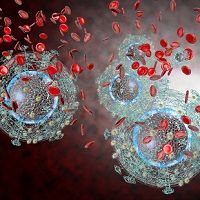VRC01 Delays Plasma Viral Rebound in Patients with HIV Who Discontinued Antiretroviral Therapy
The broadly neutralizing antibody VRC01 slowed down plasma viral rebound in patients with human immunodeficiency virus, compared to historical controls, but did not maintain viral suppression.

The broadly neutralizing antibody (bNAB) VRC01 slowed down plasma viral rebound in patients with human immunodeficiency virus (HIV), compared to historical controls, but did not maintain viral suppression. Researchers, led by Katharine J. Bar, MD, of the University of Pennsylvania and Children’s Hospital of Philadelphia, reported the results of two recent trials in the New England Journal of Medicine.
The authors said the article reports “the results of two phase 1 clinical trials designed to investigate the feasibility of achieving sustained suppression of plasma viremia (virologic remission) in HIV-infected persons by means of multiple infusions of VRC01 after the discontinuation of ART [antiretroviral therapy] that had been successfully suppressing plasma viremia below the detectable concentration.” They wanted to ascertain safety, whether or not VRC01 would be concentrated in plasma, if it would suppress plasma viremia without ART, and finally, to better understand recrudescent viruses following immunologic intervention.
The two trials had similar designs; the first, called A5340, included 14 participants, and the second, a National Institutes of Health (NIH) trial (150I-0140) had 10 participants. All participants in the A5340 trial were male, and in the NIH trial there were eight men and two women. One serious adverse event involving alcohol occurred.
“In 24 participants, ART was reinitiated on confirmation of viral rebound and their plasma viremia was suppressed again,” report the researchers. The participants in the A5340 trial did not receive ART for six weeks, and those in the NIH trial did not receive ART for eight weeks. The authors noted, “In both trials, the administration of VRC01 did not produce durable suppression of plasma viremia.”
Although there is some potential for bNAbs as an approach to prevent, treat, and perhaps cure HIV, the researchers said, “Our results suggest that the prevalence of clinically significant archived resistance to VRC01 may present a considerable challenge in the use of bNAbs as therapeutic agents for HIV infection.” They also noted that their findings indicate future studies, saying, “Analogous to current regimens of highly successful combination ART that targets multiple HIV gene products, our data suggest that immunotherapy will probably require multiple bNAbs that target different sites on the HIV envelope glycoprotein.”
Related Coverage:
HIV Prevention and Treatment May Be All in the Antibodies
2 Commerce Drive
Cranbury, NJ 08512
All rights reserved.